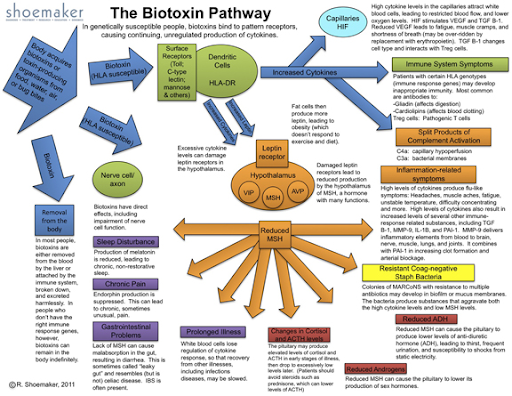
Just what does mold do? How is it possibly affecting so many organs/systems in my body?
Dr. Ritchie Shoemaker, who many call the Father of Mold Medicine, who is one of Dr. Carlson’s key leading physicians he has built his own method from, has done a fantastic job outlining just exactly what toxic mold can do to us, and more importantly, what the biotoxins do to us as they are left in our bodies. As you read it below or internalize the graph above, you may, for the first time since you became ill, finally be able to make sense of the many symptoms your body has been presenting. Hopefully along with being an aide to help you understand how to tackle this disease, it gives you some validation that you are not crazy, and that there are answers that can possibly resolve all your health concerns, or at least alleviate them drastically.
Remember, about 25% of the population has the HLA-DR gene, which means they do not have a great capability to easily methylate out all these horrible biotoxins from the body which then causes widespread inflammation all throughout.
This does not mean that every single one of them is suffering from mold illness, but it does mean that they are susceptible to it. From this group we get those that, for whatever reason, whether through an overall toxic overload, or possibly a stressful event that taxed their body to the point where it could no longer handle keeping the biotoxins in check, they end up struggling with all sorts of horrible symptoms and since mold is rarely if ever checked for by many of our healthcare providers today, these random symptoms lead the patient and physician on a wild goose chase and inevitably, some doctors tire of it (as it makes little sense to them) and then they sometimes suggest that you need to see a psychologist or therapist of some sort. This has happened to many more patients than you would think.
Below is a list of some of the symptoms that are caused by toxic mold illness:
Neurological Symptoms often caused by mold illness:
Peripheral Neuropathy (Burning Sensation, Pins and Needles, Numbness)
Depression
Fatigue
Headaches
Forgetfulness
Trouble Concentrating
Poor Balance
Loss of Motor Control
Tremors in Hands
Other symptoms often triggered by toxic mold:
CIRS (Chronic Inflammatory Response Syndrome)
Mast Cell Activation
Intolerance to Heat
Bladder Problems
Altered Sweating
Dull Achiness
Skin Problems
Digestive Disorders
Dry Eyes
Muscle Pain
sore throat
dry cough
sinus issues
The following text on the Biotoxin Pathway is from Dr. Ritchie Shoemaker. He does such a phenomenal job here that I thought I would give him the credit he is due instead of paraphrasing it. It is a phenomenal tool in first, understanding the illness, and second, what to do about it.
The Biotoxin Pathway
Stage 1: Biotoxin Effects
It all starts when a person is exposed to a biotoxin. In most people, the biotoxin is ‘tagged’ and identified by the body’s immune system and is broken down and removed from the blood by the liver. However, some individuals do not have the immune response genes (HLA-DR genes) that are required to eventually form an antibody to a given foreign antigen. In these cases the biotoxins are not ‘tagged’ and remain in the body indefinitely, free to circulate and wreak havoc.
Once present in the body, the biotoxins begin to set off a complex cascade of biochemical events. The biotoxin binds to surface receptors (Toll receptors and many more) in nearly every kind of cell in the body. This recognition and binding of the biotoxin causes a continual upregulation of multiple inflammatory pathways, including production of cytokines, split product of complement, and TGF Beta-1. Biotoxins also directly affect nerve cell function, which is one of the reasons that the symptoms and visual contrast sensitivity (VCS) test are so useful in diagnosis.
Stage 2: Cytokine Effects
Cytokines in turn bind to their receptors, causing release of MMP9 in blood. In the brain, cytokines bind to the leptin receptor, preventing its normal function in the hypothalamus. The blocked leptin receptor will no longer create the initiation of steps that lead to production of alpha melanocyte stimulating hormone (MSH). Elevated cytokines can produce many different symptoms including: headache, muscle ache, unstable temperature and difficulty concentrating. This problem is the disastrous effect of MSH deficiency. High levels of cytokines can also result in increased levels of important compounds such as I-1 and clotting factors as shown by a von Willebrand’s profile. Of importance in cardiovascular health, MMP-9 delivers inflammatory elements from the blood into sensitive tissues and can combine with PAI-1 to increase clot formation and arterial blockage.
Stage 3: Reduced VEGF
The elevated cytokine levels in the capillaries attract white blood cells, leading to restricted blood flow and lower oxygen levels in the tissues (we call this capillary hypoperfusion). Reduced VEGF leads to fatigue, muscle cramps and shortness of breath.
Stage 4: Immune System Effects
Patients with certain HLA genotypes (immunity related genes) may develop inappropriate immune responses which may include antibodies to: gliadin (gluten sensitivity), actin, anca (think ulcerative colitis), cardiolipins (affects blood clotting), and more. Most devastatingly of all, the complement system becomes chronically activated resulting in high levels of C4a.
Stage 5: Low MSH
Reduced MSH production results in yet another set of problems and symptoms. The production of melatonin is reduced which results in sleep problems. Endorphin production is suppressed which leads to chronic and sometimes unusual pain. Lack of MSH can cause malabsorption or ‘leaky gut’ which further weakens and deregulates the immune system. White blood cells eventually lose regulation of cytokine response so that opportunistic infections may occur or recovery from infections is slower.
Stage 6: Antibiotic Resistant Staph Bacteria
Reduced MSH also allows resistant staph (MARCoNS) to survive in biofilm on the mucous membranes. These bacteria further compound MSH deficiency and the problem by producing exotoxins A and B that cleave MSH, further decreasing the MSH levels. At this point, the downward spiral starts to perpetuate itself.
Stage 7: Pituitary Hormone Effects
Reduced MSH can decrease pituitary production of antidiuretic hormone (ADH) which can lead to thirst, frequent urination, neurally-mediated hypotension (NMH), low blood volume, and electric shocks from static electricity. While sex hormone production is often down-regulated the pituitary may upregulate the production of cortisol and ACTH in the early stages of illness, then drop to abnormally low, or low-normal ranges later.
***If you are serious about overcoming mold illness and all its horrible effects, such as neuropathy, forgetfulness, fatigue, headaches, depression and so much more, please print this out, read through it, and highlight it. Go over and over it until you have it down. Getting over mold illness is not as simple as taking a pill twice a day. But it can be simple enough. You just need to learn a few things.
And remember, knowledge alone is not power. Knowledge applied is power.
Here at Restore Health Today we are here to help reverse mold illness in as many people as we can. It is a silent epidemic that is causing unnecessary suffering in a surprising percentage of the population.
If you are thinking “I live in Utah, or some other dry climate. There couldn’t possibly be mold problems here, and this couldn’t possibly be the cause of my problems.”, you would be very surprised to know that mold is alive and well in Utah and many dry climates. Whether this is because everyone in the 90s and early 00s were using swamp coolers in their homes or because of improper ventilation, or because of water damage, the important thing to know is that mold is a problem that is very much a part of our lives throughout the US.
If you have questions on how to get started testing to see if mold is really the culprit to your symptoms, please feel free to call and we can guide you how to do testing at your home or can give you resources on who to call. We also provide extensive testing and treatment for mold disease and we have been very successful with many of our patients, helping them take back their health that was stolen by an unchecked and rarely tested for toxin.






